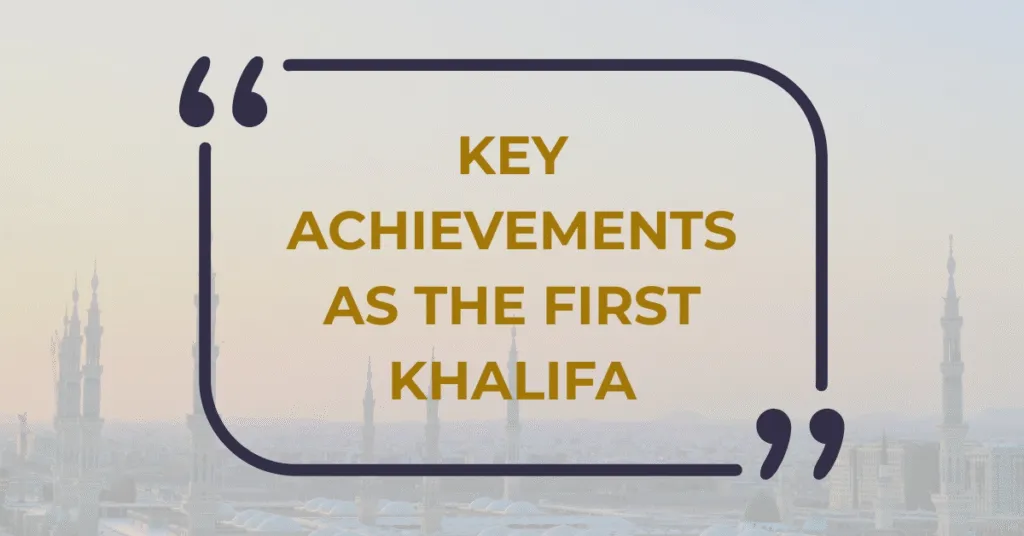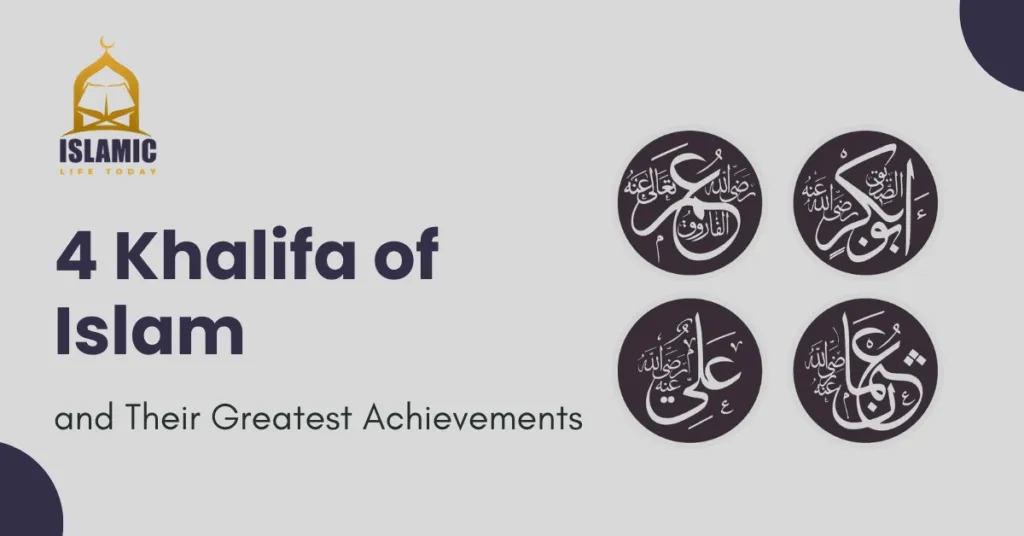The history of Islam is rich in the inspiring stories of leadership, courage and faith. The most important figures are 4 Khalifa of Islam-Hazrat Abu Bakr Siddiq (RA), Hazrat Umar Ibn Al-Khatb (RA), Hazrat Uthman Ibn Afan (RA), and Hazrat Ali Ibn Abi Talib (RA). His leadership not only shaped the early Muslim community, but also laid the foundation for the development of Islam around the world. In this article, we will find out their lives, achievements and the lessons we can learn from them today.
Introduction to the 4 Khalifa of Islam
4 Khalifa of Islam, their important roles and their leadership shaped Islamic history.
Who Were the 4 Khalifa of Islam?
The word “Khalifa” means successor or leader. The 4 Khalifa of Islam, also known as the “correctly directed Khalifa”, were the first four leaders after the Prophet Muhammad (PBUH). They are committed to their dedication, knowledge and commitment to Islam, serving as models of justice, leadership and faith.
Importance of Their Leadership in Islamic History
They led at an important time when the Muslim community was still facing youth, unsafe and internal and external challenges. Through his vision and dedication, he preserved the teachings of Islam, expanded its reach, and ensured unity and prosperity of Umma.
Hazrat Abu Bakr Siddiq (RA)
Explore the life of Hazrat Abu Bakr Siddiqu (RA), first Khalifa and his remarkable contribution to Islam.
Early Life and Conversion to Islam
Hazrat Abu Bakr (RA) was a close friend and reliable companion of Prophet Muhammad (PBUH). Among the first people to accept Islam, their unwavering belief and loyalty were unmatched. Known for his humility and generosity, Abu Bakr played an important role in spreading the message of Islam during his early days.
Key Achievements as the First Khalifa

Search the major achievements of Hazrat Abu Bakr Siddique (RA) to unite Muslims to preserve the Quran.
Preserving the Unity of the Muslim Ummah
One of his most important challenges was to keep the Muslim community united after the demise of the Prophet. During the Radida wars, Hazrat Abu Bakr (RA) successfully defeated those who tried to break, ensuring that Islam was strong and harmonious.
Compilation of the Quran
Recognizing the need to preserve the Quran, Abu Bakr (RA) began his collection of verses in a single written form. This monumental attempt ensured that the sacred text was preserved for future generations.
Hazrat Umar ibn al-Khattab (RA)
Learn about Hazrat Omar Ibn al-Khatab (RA), the second Caliph, known for its strong leadership and transformational reforms in Islam.
From Opposition to Strong Faith
Hazrat Umar (RA) was initially a fierce rival of Islam, but later embraced it wholeheartedly. Their change is a will of the power of faith and determination.
Major Achievements During His Rule
Explore the major achievements of Hazrat Umar (RA), including the expansion of the Islamic Empire and Groundbreaking administrative reforms.
Expansion of the Islamic Empire
Under the leadership of Hazrat Umar, the Islamic Empire expanded rapidly, conquering areas such as Persian, Egypt and parts of the Byzantine Empire. His military strategy and governance skills were unmatched.
Administrative and Social Reforms
Omar (Ra) was not only one winner, but also a visionary administrator. He introduced a structured tax system, established public welfare programs, and ensured justice for all citizens, set a high standard for future leaders.
Hazrat Uthman ibn Affan (RA)
Hazrat Uthman Ibn Afan (RA), discovered the life of the third Khalifa, which is famous for his generosity and preserving the Quran.
Early Life and Devotion to Islam
Hazrat Uthman (RA) was known for his purity, generosity and devotion. A rich businessman, he used his resources to support the Muslim community and pursue Islamic teachings.
Contributions and Key Achievements
Learn about the major contributions of Hazrat Umpan (RA), including standardizing the Quran and strengthening the Muslim community.
Standardization of the Quran
Uthaman (RA) is the most famous for compiling the Quran into a single, standardized text and distributing copies in various parts of the Muslim world. The Act preserved the authenticity of the sacred book of Islam.
Strengthening the Muslim Economy
He invested in infrastructure, encouraged trade, and supported economic development, ensuring that the Muslim state was economically stable and rich.
Hazrat Ali ibn Abi Talib (RA)
The fourth Caliph, Hazrat Ali Ibn, explores the life of Abi Talib (RA), which is known for his intellect, bravery and dedication to justice.
Early Life and Close Relationship with the Prophet (PBUH)
Hazrat Ali (RA), the cousin and son-in-law of Prophet Muhammad (PBUH), demonstrated knowledge, bravery, and unwavering faith. From a young age, he actively protected and spread Islam.
Notable Achievements as Khalifa
Promoting Justice and Knowledge
Ali (Ra) was a symbol of justice. He focused on fairness, equality and education, ensuring that all members of the society were treated with respect and dignity.
Challenges and Upholding Islam
His leadership faced internal conflicts, but his perseverance helped preserve Islamic values and teachings, showing courage and moral integrity in times of crisis.
Leadership Lessons from the 4 Khalifa of Islam
Exploring valuable leadership lessons from 4 Caliphas of Islam, highlighting integrity, belief and effective governance.
Integrity and Justice in Leadership
The 4 Khalifa of Islam followed honesty and fairness, proving that strong leadership lies in integrity.
Faith and Commitment to Islam
His deep faith directed every decision made by him, showing that spirituality and leadership could go by hand.
Problem-Solving and Strategic Thinking
From military operations to administrative reforms, his strategic thinking ensured the development and stability of the Muslim community.
Impact of the 4 Khalifa on Modern Muslim Society
Know how the 4 Khalifa of Islam inspired the modern Muslim society through its teachings, leadership and heritage.
Lessons for Personal and Community Life
His life teaches us about courage, patience and compassion, which today remains relevant to individuals and communities.
Inspiration for Leadership Today
Modern leaders can take inspiration from their commitment to justice, moral rule and service to people, showing that the true leadership is about serving others.
Frequently Asked Questions (FAQs)
He was Hazrat Abu Bakr Siddiq (RA), Hazrat Umar Ibn Al-Khatb (RA), Hazrat Uthman Ibn Afan (RA), and Hazrat Ali Ibn Abi Talib (RA), who were the first four leaders after Prophet Muhammad (PBH).
His main achievement was preserving the unity of Muslim Umma and starting the Quran’s compilation.
Through strategic military campaigns and effective governance, he expanded the empire to include Persia, Egypt and parts of the Byzantine Empire.
He standardized the Quran, compiled it in a single lesson and distributed copies in different regions, preserving its authenticity.
Integrity, justice, knowledge and courage in maintaining Islamic values even at the time of struggle.
Conclusion
The 4 Caliphs of Islam were more than just leaders – they were visionary, warriors of faith and paragon of justice. His achievements shaped the early Islamic world and continued to inspire millions of people today. By studying their life, we can learn how to lead with integrity, faith and compassion in both personal life and society.







